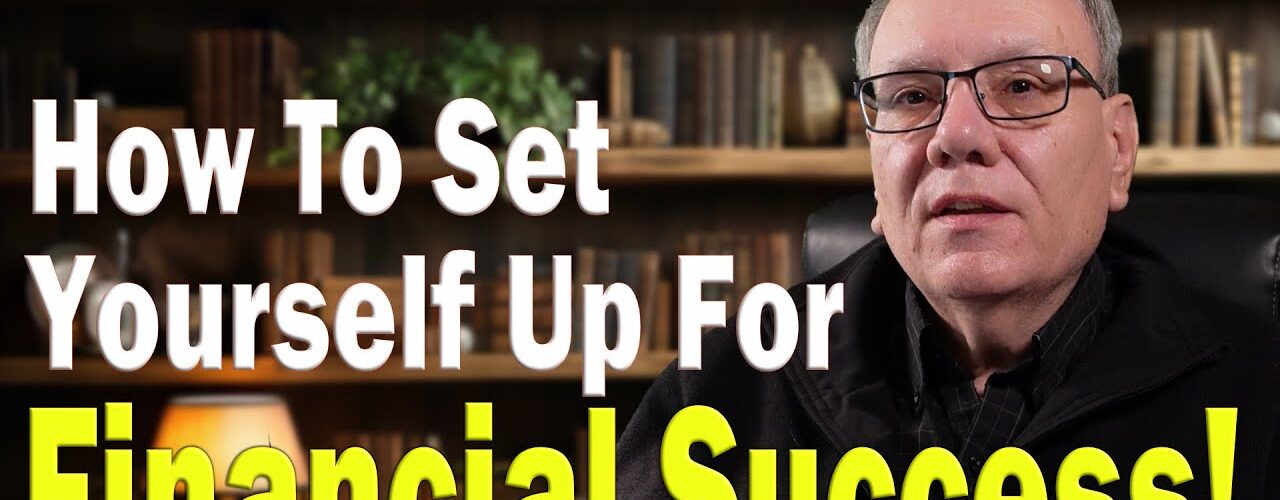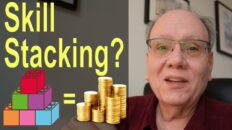Have you ever asked how do you set yourself up for financial success? Today I’m going to be covering five strategical points that I think are critical. I have found what I think is five major points that if you don’t get these five major points right you might never find financial success within your life.
So let’s get started right away with the very first strategy and that is you got to think long term. It’s a long game and you have to think that way. If you can think long term and expect your wealth to take a little longer to come to you, you can do it easier and have a lot less risk tied to it and a lot more success tied to it as well.
Research in Warren Buffett shows it actually takes a little longer than you might actually think. It took on average 32 years for the average person to become a self-made millionaire. 32 years! What? Yeah, 32 years and I believe it.
You can do it faster and I do have videos that talk about doing it faster but if you don’t get these five points right you’re not going to be faster. You might never see financial success and I don’t want that for you. I want you to find some final success in your lifetime.
So think of this as a long-term game and let me explain a few reasons why I think this is so critically important to think this way. First off, long-term success is easier than short-term success. Yeah, you could have a short-term success but I would say it’s more chance and gambling than anything else.
Sometimes you play the cards right and things work out for you but sometimes things don’t work out for you and no short-term losses can wipe out all your short-term gains. I liken it to, you know, day trading in the stock market. It’s something I just can’t do.
I’m not wired for it but when it comes to dividend investing I’ve been very successful because I play a little longer game. So that’s how I look at it. Plus, I think this does really reduce your risk if you think long-term.
You do have to make short-term changes. Don’t get me wrong about this. You have to really kind of change your stinking thinking, so to speak, to have better spending habits, etc., etc., and we’re going to be covering that a little bit deeper in some of the further points.
But you need to line up your short-term successes but don’t expect a million dollars immediately. Hey, if you can learn to save 50 bucks a month on your bills, that’s a long-term win. 50 bucks over the long term, over 30 years, can make a huge difference to your savings.
So you have to really think long-term and also, too, even some of the really big successes that we see today. A good example is Warren Buffett. Was he a millionaire like that? No! It took him a while to earn his first million but he eventually became a multi-billionaire.
So he just kept at it and he did other things on this list that are extremely important as well and he did them exceedingly well. Also, if you’re looking at this as a long-term goal, you’re not thinking about short-term exits. Oh, this isn’t working.
I’m going to try something different. If you’re constantly changing gears, you’re never going to get to your destination. You’ve got to think, again, this is a long-term goal.
When you think of Jeff Bezos, the creator of Amazon, you know how long it took him before Amazon actually was consistently profitable? 20 years. 20 years of slogging it out before he was consistently profitable. Now he’s wildly, wildly rich because of Amazon.
So Jeff took it as a long-term game. I remember seeing on the internet one time a picture of him and, you know, his dream when he actually had Amazon in a big placard in his office and I’m sure it was a rented office in the bad side of town at that time. Who knows? But he had the long-term in mind and he has played it well.
So hats off to him. Number two is you got to make a plan that lets you step towards your goal because a long-term goal is made of a lot of short-term plans. Initially, when you’re starting out, think of a short-term goal that you can succeed at or a short-term habit you can create or a bad habit you can get rid of that takes you to your long-term goal.
As I mentioned earlier, just cutting 50 bucks off your expenses every month can get you there and believe it or not you may find it easier than you think to cut a lot more than 50 bucks. By the time I had axed anything I thought was, you know, shluffing my expenses, I cut over $1,400 a month off every single month and I’ve continued to do that and I do it every quarter. I go and I look at all my bills and I’ve noticed, oh I picked up a subscription here for this, I don’t need that anymore or I’ve got that or I’m paying more here and I watch my bills to make sure they’re all accurate as well and that’s really important.
Just this month my power company had totally botched my bill and overcharged me by about two or three hundred dollars. If it wasn’t for me watching my bills I might have paid that two or three hundred bucks and would never known the difference but it still came out of my pocket. You get what I’m throwing here? Also as part of your plan you need to learn how to pay yourself first.
This is so so critical. I actually have always said to anybody who wants to have long-term financial success, you gotta learn how to pay yourself first. So in other words, you are one of your first expenses every payday and you slice off a piece of that.
I recommend 10% if you can do it, 20 is better but even in the beginning if you can’t do 10% something is better than nothing. So slice off a bit and start paying yourself first. You want to take this extra money and put it aside in an account that you don’t touch because in the long run you’re saving not to spend and I’ll be touching that again here in just a moment.
Number three, start to build your financial education. Wow, this is so important. You might say, oh I haven’t got a head for numbers.
Well you got to get ahead for numbers. I remember one time somebody said to me, well you know I just don’t read too well. I said, well you got to fix that, got to fix that.
You haven’t got a head for numbers, you got to fix that. You need to get ahead for numbers and you don’t need to be a financial genius. You don’t need to be Warren Buffett.
I’m not Warren Buffett by any stretch of the imagination but I do get good returns. Make it your goal to learn how to invest wisely. In the beginning your investing might not be that great.
Hey you might just put it into a savings account which gives you half a percent. You ain’t gonna get rich on that and you’ll see why in a few minutes here. But eventually you want to get to a point if you want to stay safe and play it safe you can get that up to much higher.
Why is it the S&P 500 can get anywhere from 8 to 10 percent on average every single year regardless of the ups and downs? Got to make you think. If you can’t get 8 to 10 percent you’re doing something wrong and you need to figure out what it is and fix it. Again we’re not talking about gambling here.
We’re not talking about day trading options or anything like that and I’m not saying that’s bad but it does take a certain kind of person to do it. Like I said I’m not that kind of person but I do get over 15 percent in dividend investing and as you can guess yes I’m a dividend investor. I think that’s a great way to build a strong portfolio but did I have 15 percent on the first day? Heck no.
I was getting two or three percent on the first day but eventually I got more savvy and I learned more. I watched videos on YouTube. I subscribed to some YouTubers who have inner circles who talk about investing and I learned more and more and more from various people.
Now I had to go do my own research and you’ve got to do your own research too. You’ve got to get your own head when it comes to finances and it doesn’t only include when you’re building your financial education doesn’t only include investing. It also includes how you handle your money right now.
I’m going to use the budget word. Some people think that’s a swear word but it really isn’t. A budget’s going to keep you honest.
Again the numbers never lie. If you have a budget and you allocate your money and there’s a lot of simple ways to do it. If you allocate your money it’ll keep you on the straight and narrow and you will be see financial success in your life.
Now the harder you work at it the faster you’ll get there. I’m a really good example. I’m about to crest $170,000 and I started just over two and a half years ago.
People would say well that’s impossible you must have started out with a whole bunch of money. I didn’t. The only thing I started out with was $20,000 sitting in an RRSP account.
I think it was less than $20,000 and I built onto that and built onto that and built onto that and it’s nickeling and diming and whatever extra money and when the tax return comes at the end of the year I don’t go party time. I put it in my investment account. I was saying to my wife since we started investing I put two tax returns in and we get an average tax return of 7% and if we’re getting a 15% return on that we’ve saved between $15,000 and $20,000 that we would have just blown away.
So it all counts. You need to learn when you learn investing you need to learn how to differentiate gambling and investing. Yes investing has some risk associated to it but you want to make sure those risks are within your risk tolerance.
In other words you’re willing to so you lose the money on an investment you’re willing to sleep at night because of it but gambling is a whole different animal. Gambling is you know you could do really well but you could you could lose it all really easy and I’ve gambled a lot of money away in bad investments. Things that were for sure and they were had no risk and they were excellent and they were this and they were that and I’ll tell you something at the end of the day the money was gone.
Okay so learn to differentiate between gambling and investing and I can tell you a quick way to differentiate it is if the returns seem unrealistic to you then it’s gambling for you. In the beginning having an investment that had that paid me 15% was gambling to me so I wasn’t in those but now I’ve gotten a lot more education a lot more understanding getting a point here knowledge is important when it comes to investing you got to be knowledgeable like I said you got to have to have you got to get ahead for numbers that’s really important here. So as you become more skilled and you understand better what happens is it becomes less gambling and more investing because you make wise choices on where you put your money very important.
Number four you got to start learning how to change long-standing bad spending habits and create good habits instead. Believe it or not it’s really easy to hold on to those bad habits for instance you go to the store and you impulse buy that’s a bad spending habit. If you do have a budget and you differentiate your money and decide like for example I have so much fun money every month and when it’s gone we ain’t gonna have any more fun this month and that’s it and I don’t go beyond that.
I just had to make some course correction and you’re always making course correction don’t get this wrong because I realized that we had spent like 1500 bucks on our MasterCard that I did not allocate so I said put away the credit cards we’re not using them we’re paying them off stop spending on them because we did some bad spending on it. Now you could say well we needed this we needed that but you know really at the end of the day if you got to put it on a credit card you might not need it. It might be a need to think about building a fund up to pay for these extra things if you have emergencies and it’s called an emergency fund.
Okay that’s a good spending habit have an emergency fund for those emergencies that crop up.
But let me give you an example so what should you expect if you start putting together a good investment plan and where you’re working yourself towards that financial success. I’m going to read this so I don’t screw it up. Say you have $10,000 every year that you put away and another $10,000 and another $10,000 and another $10,000 every year so it’s about $800 a month on an average you get a six percent return on your investment and in my opinion six percent is low once you get better at investing but let’s say it’s only six percent and in 32.5 years your savings will total $1,000,000 kind of lines up with that 32 year thing we were talking about earlier.
Something to think about so that’s just a quick point you can be a lot more aggressive than that like I said I believe that if you’re really good you can get become a millionaire within 10 years. I think I can do it in 10 years and I’m being very aggressive I think I can do it less than 10 years I think I can do it about seven maybe eight dots. That does require me to be extremely aggressive though just a heads up but let’s get to point number five.
Learn what the power of compound interest is all about. Einstein called it the eighth one of the world and I firmly believe it. Do you know right now my investments are returning me every single month.
Rainy, sunny, snowing, hurricane whatever it is about $1,800 a month. Believe it or not and that’s only $170,000 and I can see how this will become my first level of financial success when it starts returning me about three to four thousand dollars a month. When I hit that plateau I’ve got all my basic expenses covered and then I start to become wealthy because then I have more than what I need and that’s going to be exciting.
So yeah so you’ve got to think about how powerful compound interest is. Compound interest is a force that will either make you broke or make you rich. If you’ve got lots of credit card debt compound interest will wipe you out.
Payday loans will wipe you out. You saving and you’re putting away every month compound interest is your friend and it’s your ally and it will allow you to grow money. Did you know that with the power of compound interest if you save only $330,000 and then that example I illustrated earlier the rest of it is compound interest.
Just you put in $330,000 and the rest of it the other six or seven hundred thousand is compound interest over those 32 years. That’s crazy. That’s the power of compound interest so you’ve got a lot of compound interest to become your friend and let me give you a little formula and I do talk about it in other videos and take a peek on my channel.
It’s called the rule 72. The rule 72 states you can take 72 and divide it by whatever rate of return you’re getting. Let’s say it’s 10 percent.
You’re getting 10 percent. It’ll take 7.2 years to turn $1 into $2, $2 into $4, $4 into $8. I think you get the point.
If you get 20 percent interest the number drops down to about 3.6 years. If you only get one percent on your measly savings account and you think your money is all you know money is saved my money is saved. It’s going to take you 72 years to double your money because one percent divided into 72 is 72 so it’s going to take you 72 years.
So you got to keep that in mind. Compound interest is either your ally or it’s your enemy. You want it to be your ally in this race.
So I hope this helps you. I hope this helps you figure out how you’re going to set yourself up for financial success. I’ve touched the high points here.




